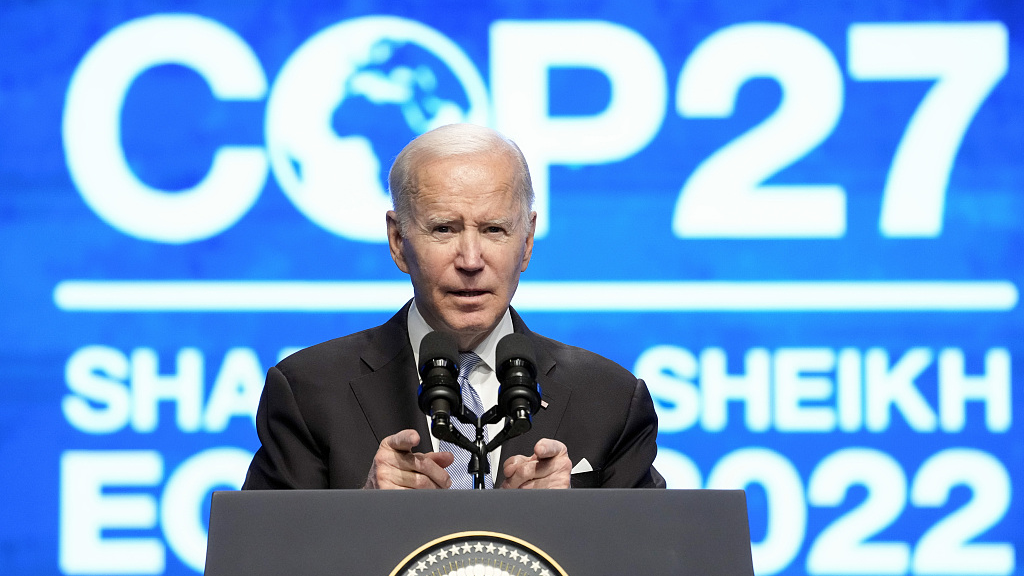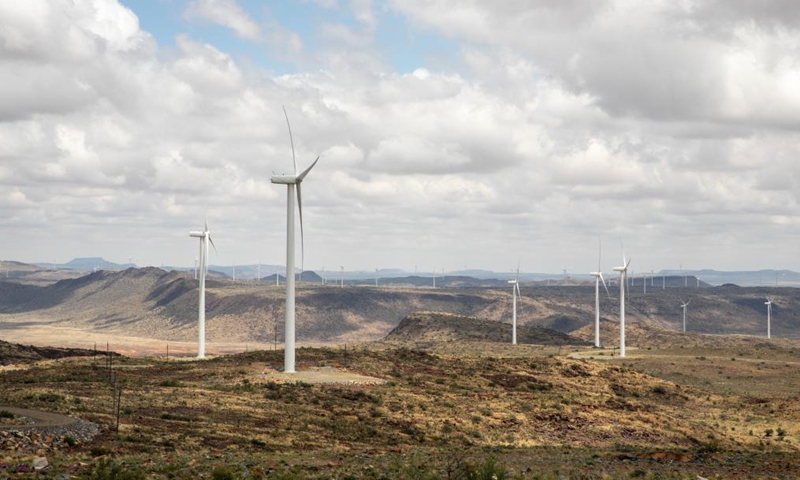
President Joe Biden speaks at the 27th session of the Conference of the Parties to the UN Framework Convention on Climate Change, in Sharm el-Sheikh, Egypt, November 11, 2022. /CFP
President Joe Biden speaks at the 27th session of the Conference of the Parties to the UN Framework Convention on Climate Change, in Sharm el-Sheikh, Egypt, November 11, 2022. /CFP
Editor's note: Mariam Shah is an Islamabad-based independent researcher in the field of conflict studies and military psychology. The article reflects the author's opinions and not necessarily the views of CGTN.
To ensure that future generations can live in a safer environment, the world must cooperate on multilateral dimensions. We are confronting crisis after crisis. The world is in chaos, whether it's a pandemic, climate change, food, energy, or refugee crisis. The question is, what should be done and how? Multilateralism, solidarity, and cooperation remain the primary means of overcoming the grave challenges the world is facing.
We can evade the war, but we cannot escape the looming climate crisis that has infiltrated our house. The climate issues are and will affect all of us, regardless of our location, nationality, or race. Nobody could flee the danger by becoming an isolationist. Unfortunately, we keep forgetting how much we all are interdependent. We share the climate, land, ocean, and water, an example of our interconnectedness. Whether we like it or not, we must safeguard our planet's future.
We need cooperation at every step to end wars, ensure peace, and fight pandemics and climate change. World powers must work on multidimensional fronts to relieve the suffering of the masses. Partnership, cooperation, and multilateralism are indeed the need of the hour.
China has become a "champion of multilateralism" as it keeps campaigning about cooperation and opposes unilateralism, bloc politics, and exclusive groups intended to target specific nations.
On November 8, China's Special Envoy for Climate Change, Xie Zhenhua, addressed the 27th session of the Conference of the Parties to the UN Framework Convention on Climate Change (COP27) in Egypt's coastal city of Sharm El-Sheikh. He stressed that developed countries should fulfill their pledge to provide $100 billion in climate finance as soon as possible and draw a road map for doubling the adaptation fund. He added that China is ready to collaborate with all parties to uphold multilateralism, establish a just and acceptable system of global climate governance through win-win cooperation and contribute more to addressing the issues brought about by climate change.
After a span of more than a decade, the rich countries appear ready to act on providing climate aid. At COP27, several European leaders unveiled funding to assist developing countries in repairing losses and damage from climate change.
A number of European countries pledged support for climate-affected countries, while China offered aid to developing nations in upgrading its capacity for adaptation through South-South cooperation. China has given two billion Chinese yuan ($275.8 million) to developing nations for adaptation and mitigation.

Wind turbines of the De Aar wind power project invested by China's Longyuan Power and its South African partners in De Aar, South Africa, November 22, 2021. /Xinhua
Wind turbines of the De Aar wind power project invested by China's Longyuan Power and its South African partners in De Aar, South Africa, November 22, 2021. /Xinhua
As usual, the U.S. remains in a state of insensitivity regarding climate-related matters and their devastating effects on the developing world, although it is the biggest emitter of greenhouse gases in cumulative terms and one of the world's wealthiest countries, while capable of providing more climate aid. The U.S. has not agreed to a new fund, but John Kerry, President Joe Biden's climate envoy, decided to discuss financing for the losses at the climate summit. .
It's high time that the West should be better served to take more pragmatic measures and advocate for reparations for developing nations that have suffered much from climate change. Moreover, rich countries should stop using the developing countries to pursue their climate ambitions, as it is twice as destructive for them.
The competitive approach to global challenges is not constructive for sustainable peace and development but rather "win-win cooperation" for all. The strategy should not focus on creating division but on interconnection and mutual respect between the states. It's time to deal with the climate crisis with compassion for those displaced or affected. A peaceful world based on shared values and cooperation will emerge from shared responsibility.
(If you want to contribute and have specific expertise, please contact us at opinions@cgtn.com. Follow @thouse_opinions on Twitter to discover the latest commentaries in the CGTN Opinion Section.)